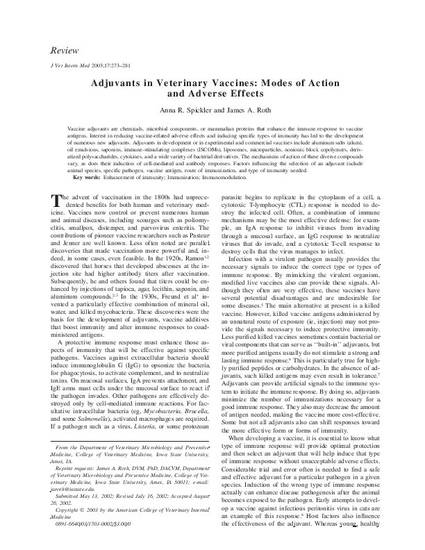
Article
Adjuvants in Veterinary Vaccines: Modes of Action and Adverse Effects
Journal of Veterinary Internal Medicine
Document Type
Article
Disciplines
Publication Version
Published Version
Publication Date
5-1-2003
DOI
10.1111/j.1939-1676.2003.tb02448.x
Abstract
Vaccine adjuvants are chemicals, microbial components, or mammalian proteins that enhance the immune response to vaccine antigens. Interest in reducing vaccine-related adverse effects and inducing specific types of immunity has led to the development of numerous new adjuvants. Adjuvants in development or in experimental and commercial vaccines include aluminum salts (alum), oil emulsions, saponins, immune-stimulating complexes (ISCOMs), liposomes, microparticles, nonionic block copolymers, deriv-atized polysaccharides, cytokines, and a wide variety of bacterial derivatives. The mechanisms of action of these diverse compounds vary, as does their induction of cell-mediated and antibody responses. Factors influencing the selection of an adjuvant include animal species, specific pathogen, vaccine antigen, route of immunization, and type of immunity needed.
Rights
This is an open-access article distributed under the terms of the Creative Commons Attribution License, which permits unrestricted use, distribution, and reproduction in any medium, provided the original author and source are credited.
Copyright Owner
Anna R. Spickler and James A. Roth
Copyright Date
2003
Language
en
File Format
application/pdf
Citation Information
Anna R. Spickler and James A. Roth. "Adjuvants in Veterinary Vaccines: Modes of Action and Adverse Effects" Journal of Veterinary Internal Medicine Vol. 17 Iss. 3 (2003) p. 273 - 281 Available at: http://works.bepress.com/james_roth/30/

This article is from Journal of Veterinary Internal Medicine 17 (2003): 273, doi:10.1111/j.1939-1676.2003.tb02448.x. Posted with permission.